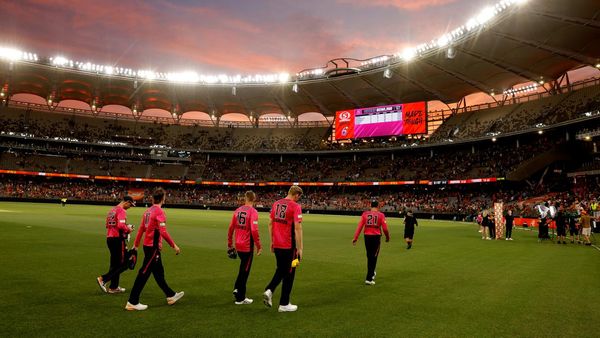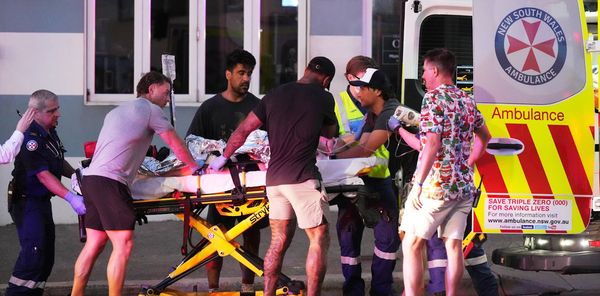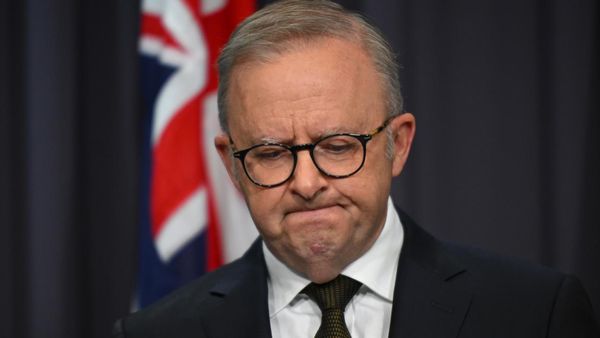
From the moment he first laid eyes on it, Steven Donziger knew he had to do something about the oil. It was 1993, and the newly graduated human rights lawyer was in Ecuador investigating allegations that Texaco had dumped billions of gallons of toxic waste in the Amazon rainforest.
“I expected to see pollution, but I was shocked at the level of it,” he remembers now. “It was just blatantly out there on the floor of the jungle. Olympic swimming pool-sized lakes of oil that had been placed there deliberately by Texaco, then left and abandoned. They were leaching into the soil. There were pipes draining into the streams and rivers that people were drinking out of. It was obvious it was an apocalyptic nightmare.”
That moment lit a fire in Donziger that still burns to this day, 30 years on. Beneath swaying palm trees in a hotel bar in Santa Monica, the 62-year-old is speaking passionately about the case that consumed his life. At 6ft 4in, with close-cropped grey-white hair, he cuts a commanding but good-humoured figure, especially considering that until a few months ago an ankle tag had kept him confined to his Manhattan apartment for 993 days.
It was back in 2011 that he and his team won a $9.5bn settlement against Chevron, which bought Texaco in 2001, but the oil giants never paid. They fought the ruling, and in 2018 an international tribunal found that Chevron had been released from liability for the pollution in the Amazon and ordered Ecuador not to enforce the judgement. Then, Donziger ended up under house arrest. “We’re going to launch a campaign ... to ask President Biden to pardon me,” he says. “Based on the blatant illegality of what happened to me.”
Starting in 1993, Donziger spent almost two decades fighting a class-action lawsuit against Texaco, and then Chevron, on behalf of the 30,000 farmers and indigenous people who claimed they suffered environmental damage and health problems caused by drilling in northeast Ecuador’s Lago Agrio oil field.
In 2011, an Ecuadorian court found Chevron liable and awarded the plaintiffs $18bn in damages. This ruling was upheld by Ecuador’s highest court, although the damages were eventually reduced to $9.5bn. Chevron, however, denied responsibility, refused to pay and reportedly moved its assets out of the country. One Chevron spokesperson was quoted as saying: “We’re going to fight this until Hell freezes over – and then we’ll fight it out on the ice.”
Back in America, they went after Donziger himself. The same year they were found liable in Ecuador, Chevron filed a damages claim against Donziger in New York City.
Chevron argued that the company had been released from any liability after it paid $40m for an environmental clean-up in 1998 and that Ecuador’s state oil company, Petroecuador, was primarily to blame for the pollution. They said Donziger was simply trying to shake them down to win a payout, and further claimed that he had bribed a judge in Ecuador in an attempt to secure a favourable verdict. Donziger has always strenuously denied this.
“It felt unbelievable,” he says. “I’ve read my whole life about people who confess to crimes they didn’t commit because they’re under so much stress. As I was going through this process, I finally get why people do that. It’s so stressful, it’s almost easier to say you did it just to get them off your back.”. However, the courts found in Chevron’s favour and Donziger lost the case.
In August 2019, while that case was still ongoing, Donziger was charged with criminal contempt of court and, deemed a flight risk, was put under house arrest that lasted until April 2022. In July 2021, he refused to comply with a court order requiring him to hand over his computer, phone and legal files to Chevron, arguing that to do so would violate attorney-client privilege. He was found guilty of contempt and spent 45 days in prison. The Harvard Law School graduate, who played basketball with classmate Barack Obama, was disbarred and remains unable to practise law as a result of the contempt conviction.
In October 2021, the United Nations Human Rights Council issued a legal opinion that Donziger’s imprisonment contravened several articles of the Universal Declaration of Human Rights, and called on the US government to release and compensate him. While he’s no longer confined to his home, Donziger points out that he’s still not entirely free. “It’s nice to be able to leave my apartment when I want, but I’m still somewhat a prisoner of the United States of America,” he says. “They haven’t given me my passport.”
Donziger’s inability to travel means he cannot return to Ecuador, the country he has visited some 250 times since that first life-altering trip in 1993, nor can he travel to any other country where indigenous people may feel they have a case against giant corporations who’ve polluted their land in search of profits.
“Of course I didn’t know this in 1993, but as I look back I think what happened was, as we gained traction and became more successful, they decided that the threat was not just this one case, but that the model of the case could affect, potentially, their operations all over the world,” says Donziger. “Lest some other communities and other countries get inspired by these communities. They saw a $10bn liability as potentially worth 100 times that.”
Donziger believes Chevron pursued claims against him personally in order to discourage this sort of legal action ever being taken again. “This paradigm terrifies the industry,” he says. “They’re used to normal legal cases, and they just smash them. They win almost all of their cases because they just crush people. This is a new kind of thing, and the liability they’re facing on a global scale is in the trillions of dollars. The model represents an existential threat to the industry, and that is why they are trying to destroy me.”
In response to these claims, a Chevron spokesperson told The Independent: “The Ecuador lawsuit is a well-documented fraud and Steven Donziger is an adjudicated racketeer who was convicted of criminal contempt. He was disbarred for ‘egregious professional misconduct’ in the Ecuador case, including fraud, bribery, and coercion. His indigenous Ecuadorian clients fired him years ago for refusing to disclose how he spent tens of millions of dollars raised in their name.” They noted additionally that multiple courts have declined to enforce what they call “the illegitimate Ecuadorian judgement.”
Donziger replied with statement that reads in part: “Chevron should immediately cease its... campaign against me and… compensate the Indigenous peoples and farmer communities it poisoned in Ecuador.”
Now that he’s at least free to leave his home, Donziger has been taking his story on the road. In the summer he teamed up with Chris Smalls, who made history as the first organiser to unionise an Amazon warehouse, for a speaking tour dubbed ‘Hot Labor Summer’. He says there are clear links between what happened in the Amazon and social injustice here in America. “The fundamental problem with the United States of America, to me, is the money isn’t spread around enough,” he says. “There’s massive inequality of income and wealth, and corporations have way too much power to depress wages. Our laws don’t protect workers. Someone can work 40 years and you can fire them with no benefits and no severance. There’s a real asymmetry between corporate power and worker power.”
Chris Smalls at a labour protest at the New York Times Deal Book Summit— (Getty Images)
Even after everything he’s been through, Donziger remains confident the people of Ecuador can find a way to enforce the judgement against Chevron in a court of law. For his part, he remains determined to keep telling his story, and advocating for the people of Ecuador. “I have no doubt Chevron decided I was the weak link, and they used 60 law firms and 2,000 lawyers to f***ing blow me up,” he says. “But you know, here I am still talking. I don’t think they succeeded, and I have more support than I’ve ever had. But the sad reality is, the people down there who are affected and need resources have not gotten those resources. Yet.”
The tragedy is those toxic swimming pools Donziger saw 30 years ago are still there, still leaching into the soil, poisoning the water. “There’s been sort of half-measured, weak attempts by various parties – not Chevron, but the government or some people who come up with solutions like ‘human hair can sop up the oil!’,” says Donziger, incredulously. “They’re not real solutions. They’re little band aids here and there. It’s going to take billions of dollars to deal with the environmental fallout of this problem. There’s no blueprint, anywhere in the history of the world, for cleaning up this kind of environmental disaster.”







